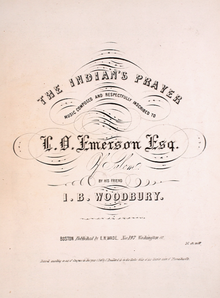The Indian's Prayer
| "The Indian's Prayer" | |
|---|---|
 Cover of sheet music, 1846. | |
| Song | |
| Language | English |
| Written | 1846 |
| Composer(s) | I.B. Woodbury |
| Lyricist(s) | Anonymous |
"The Indian's Prayer" is a popular song with music composed by I.B. Woodbury in 1846. The 1833 original lyric, used in altered form, was published as "The Indian's Entreaty" in a Universalist journal[1] by Rev. John Perry, a Pennsylvania minister. The poem was claimed to reflect the likely thoughts of a boy described as having left (or escaped) "some years ago" from "one of many colleges" to return to his native tribe.
Woodbury, a composer of religious music, dedicated the song to his friend and student L.O. Emerson, Esq.
A setting of the text (similar to Woodbury's version) appears in William Walker's Southern Harmony and Christian Harmony, under the title "The Indian's Petition".
Lyrics
[edit]Rev. Perry's original poem, in 11-syllable lines:
- Let me go to my home in the far, far west,
- To the scenes of my youth, which I love the best.
- Where cedars are green, and the bright waters flow,
- Where kindred will greet me—white man, let me go.
- I long for the spot where the cataract plays,
- Where I've sported so free in my infant days,
- And the deep forest, too, where with quiver and bow,
- I've chas'd the wild deer—Oh! there let me go.
- Let me go to the hills and vallies so fair,
- Let me breath in freedom my own mountain air;
- And to my poor mother whose heart will o'erflow,
- When she looks on her boy—to her let me go.
- Let me go to my sire, by whose vet'ran side
- I have march'd to the fight in my spirits pride;
- With him I have conquer'd the insolent foe—
- To that Chieftain-father, once more let me go.
- And oh! let me go to my dark-eyed maid;
- We've climbed o'er the hill-tops, repos'd in the glade,
- As the fawn she's gentle, her heart, pure as snow,
- And she loves the poor Indian—oh! let me go.
- Then let me away to my own forest home,
- And ne'er from it again, will I wish to roam—
- Oh! there let my ashes in peace be laid low
- To my home in the west, white man, let me go.
- Disdaining their fetters, the Indians proud soul,
- Could not bend in submission, or brook their control—
- But free, as the wind, with morning's first dawn,
- To his lov'd forest home, the red boy had gone!
The lyrics as they appear in Woodbury's original sheet music:[2] have been altered from the original by an unknown hand, mainly to be in 12-syllable lines rather than 11. Several undated broadsides titled "Indian Hunter" offer variants on these words.[3][4][5]
- Let me go to my home in the far distant west,
- To the scenes of my childhood in innocence blest;
- Where the tall cedars wave and the bright waters flow,
- Where my fathers repose. Let me go, let me go.
- Where my fathers repose. Let me go, let me go.
- Let me go to the spot where the cataract plays,
- Where oft I have sported in boyhood’s bright days,
- And greet my poor mother, whose heart will o’erflow
- At the sight of the child. Let me go, let me go.
- At the sight of the child. Let me go, let me go.
- Let me go to my sire, by whose battlescar’d side,
- I have sported so oft in the morn of my pride,
- And exulted to conquer the insolent foe,
- To my father, the chief, let me go, let me go.
- To my father, the chief, let me go, let me go.
- And oh! let me go to my flashing eyed maid,
- Who taught me to love, ’neath the green willow’s shade,
- Whose heart, like the fawn’s, leaps as pure as the snow,
- To the bosom it loves. Let me go, let me go.
- To the bosom it loves. Let me go, let me go.
- And oh! let me go to my wild forest home—
- No more from its life-cheering pleasures to roam.
- ’Neath the groves of the glen, let my ashes lie low—
- To my home in the woods, let me go, let me go.
- To my home in the woods, let me go, let me go.
References
[edit]- ^ The New-York Christian Messenger and Philadelphia Universalist (Vol. 3, No. 9, Dec. 1833)
- ^ Woodbury, "The Indian's Prayer" (Sheet music).
- ^ "Search results for America Singing: Nineteenth-Century Song Sheets, @field(TITLE @od1(The Indian hunter Printed and for sale at G S Harris' S e Cor of 4th Vine STS , Phila [n d ])), Available Online".
- ^ "Search results for America Singing: Nineteenth-Century Song Sheets, @field(TITLE @od1(The Indian hunter H de Marsan, Publisher, 54 Chatham Street, N Y [n d ])), Available Online".
- ^ "American Memory from the Library of Congress".
Bibliography
[edit]- Woodbury, I.B. (m.); Anonymous (w.). "The Indian's Prayer" (Sheet music). Boston: E.H. Wade (1846).
